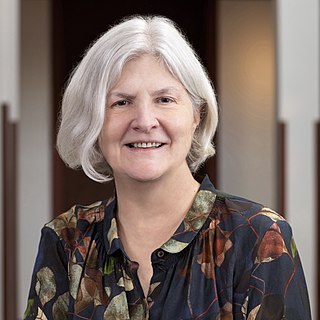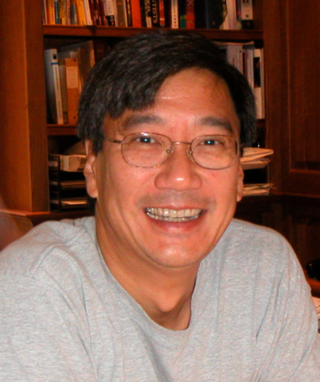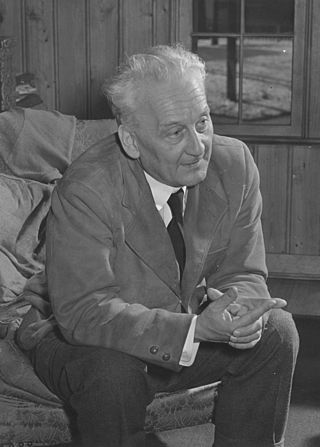Related Research Articles
The Doctorate of Medicine and of Philosophy (MD–PhD) is a dual doctoral degree for physician–scientists, combining the professional training of the Doctor of Medicine degree with the research expertise of the Doctor of Philosophy degree; the Ph.D. is the most advanced credential in the United States. Other dual degree programs exist, such as the joint MD–JD degree; both the JD professional degree and the MD are not universally recognized internationally, however. The National Institutes of Health currently provides 50 medical schools with Medical Scientist Training Program grants that support the training of students in MD–PhD programs at these institutions through tuition and stipend allowances. These programs are often competitive, with some admitting as few as two students per academic year. The MCAT score and GPA of MD–PhD matriculants are often higher than MD only matriculants.

Richard Marc Losick is an American molecular biologist. He is the Maria Moors Cabot Professor of Biology at Harvard University and a professor at the Howard Hughes Medical Institute. He is especially noted for his investigations of endospore formation in Gram positive organisms such as Bacillus subtilis.

Russ Biagio Altman is an American professor of bioengineering, genetics, medicine, and biomedical data science and past chairman of the bioengineering department at Stanford University.
Vamsi K. Mootha is an Indian-born American physician-scientist and computational biologist. He is an Investigator of the Howard Hughes Medical Institute, Professor of Systems Biology and Medicine at Harvard Medical School, Investigator in the Department of Molecular Biology at Massachusetts General Hospital. He is also an Institute Member of the Broad Institute.

Nancy C. Andrews NAS is an American biologist and physician noted for her research on iron homeostasis. Andrews was formerly Dean of the Duke University School of Medicine.

Peter S. Kim is an American scientist. He was president of Merck Research Laboratories (MRL) 2003–2013 and is currently Virginia & D.K. Ludwig Professor of Biochemistry at Stanford University, Institute Scholar at Stanford ChEM-H, and Lead Investigator of the Infectious Disease Initiative at the Chan Zuckerberg Biohub.
Xiaowei Zhuang is a Chinese-American biophysicist who is the David B. Arnold Jr. Professor of Science, Professor of Chemistry and Chemical Biology, and Professor of Physics at Harvard University, and an Investigator at the Howard Hughes Medical Institute. She is best known for her work in the development of Stochastic Optical Reconstruction Microscopy (STORM), a super-resolution fluorescence microscopy method, and the discoveries of novel cellular structures using STORM. She received a 2019 Breakthrough Prize in Life Sciences for developing super-resolution imaging techniques that get past the diffraction limits of traditional light microscopes, allowing scientists to visualize small structures within living cells. She was elected a Member of the American Philosophical Society in 2019 and was awarded a Vilcek Foundation Prize in Biomedical Science in 2020.
Zhijian "James" Chen is a Chinese-American biochemist and professor in the department of molecular biology at University of Texas Southwestern Medical Center. He is best known for his discovery of mechanisms by which nucleic acids trigger innate and autoimmune responses from the interior of a cell, work for which he received the 2019 Breakthrough Prize in Life Sciences.
Ronald R. Breaker is an American biochemist who is a Sterling Professor of Molecular, Cellular, and Developmental Biology at Yale University. He is best known for the discovery of riboswitches. His current research is focused on understanding advanced functions of nucleic acids, including the discovery and analysis of riboswitches and ribozymes.
Stephen Joseph Elledge is an American geneticist. He is the current Gregor Mendel Professor of Genetics and of Medicine at the Department of Genetics of Harvard Medical School and in the Division of Genetics of the Brigham and Women's Hospital. His research is focused on the genetic and molecular mechanisms of eukaryotic response to DNA damage and is known as the discoverer of the DNA damage response (DDR).

Richard H. Scheller is the former Chief Science Officer and Head of Therapeutics at 23andMe and the former Executive Vice President of Research and Early Development at Genentech. He was a professor at Stanford University from 1982 to 2001 before joining Genentech. He has been awarded the Alan T. Waterman Award in 1989, the W. Alden Spencer Award in 1993 and the NAS Award in Molecular Biology in 1997, won the 2010 Kavli Prize in Neuroscience with Thomas C. Südhof and James E. Rothman, and won the 2013 Albert Lasker Award for Basic Medical Research with Thomas Südhof. He was also given the Life Sciences Distinguished Alumni Award from University of Wisconsin–Madison. He is a Fellow of the American Academy of Arts and Sciences and a Member of the National Academy of Sciences.
Mark A. Krasnow is a Professor of Biochemistry at Stanford University School of Medicine. He earned his B.S. in Biology and Chemistry from the University of Illinois in 1978, his Ph.D. in biochemistry in 1983, and his M.D. in 1985 from The University of Chicago under the guidance of Nicholas R. Cozzarelli. He did his postdoctoral work on the Ultrabithorax gene with David Hogness at Stanford University. He has been a professor at Stanford since 1988 and is currently the chair of the program. His research is focused on understanding the molecular, genetic, and cellular mechanisms of tracheal development using drosophila and mice. He has been a Howard Hughes Medical Institute (HHMI) investigator since 1997 and is a Fellow of the American Association for the Advancement of Science and the American Academy of Arts and Sciences. He has been elected as the National Academy of Medicine in 2016, and the National Academy of Sciences in 2019.

The Szent-Györgyi Prize for Progress in Cancer Research, established by National Foundation for Cancer Research (NFCR) and named in honor of Albert Szent-Györgyi, Nobel laureate and co-founder of NFCR, has been awarded annually since 2006 to outstanding researchers whose scientific achievements have expanded the understanding of cancer and whose vision has moved cancer research in new directions. The Szent-Györgyi Prize honors researchers whose discoveries have made possible new approaches to preventing, diagnosing and/or treating cancer. The Prize recipient is honored at a formal dinner and award ceremony and receives a $25,000 cash prize. In addition, the recipient leads the next "Szent-Györgyi Prize Committee" as honorary chairman.

Erin K. O'Shea is an American biologist who is president of the Howard Hughes Medical Institute (HHMI). In 2013, she was named HHMI's vice president and chief scientific officer. Prior to that, she was a professor of molecular and cellular biology and chemistry and chemical biology at Harvard University. In 2016, her appointment as future, and first woman, president of HHMI was announced. She has been a Howard Hughes Medical Institute (HHMI) investigator since 2000.
Stuart Holland Orkin is an American physician, stem cell biologist and researcher in pediatric hematology-oncology. He is the David G. Nathan Distinguished Professor of Pediatrics at Harvard Medical School. Orkin's research has focused on the genetic basis of blood disorders. He is a member of the National Academy of Sciences and the Institute of Medicine, and an Investigator of the Howard Hughes Medical Institute.
Carl O. Pabo is a biophysicist. He is the founder and president of Humanity 2050, a nonprofit institute.
Michael Green was an American molecular biologist and cell biologist at the University of Massachusetts Medical School, where he was the chair of the Department of Molecular, Cell and Cancer Biology, director of the UMass Cancer Center, and a Howard Hughes Medical Institute investigator. Green was a member of the National Academy of Sciences and the National Academy of Medicine.
Paul A. Khavari is the Carl J. Herzog Professor at the Stanford University School of Medicine and the Founding Co-Director of the Stanford Program in Epithelial Biology. He is an elected member of the National Academy of Medicine.
Konstantina Marka Stankovic is an otolaryngologist and physician-scientist working as the Bertarelli Foundation Professor and Chair of Nanotechnology–Head and Neck Surgery at Stanford University School of Medicine since 2022.
References
- ↑ "Howard Y. Chang, MD PhD". Stanford University Neurosciences Institute.
- ↑ "Howard Y. Chang, MD, PhD". Howard Hughes Medical Institute. Retrieved January 10, 2020.
- ↑ "Curriculum Vitae: Howard Y. Chang". Stanford University. Archived from the original on December 5, 2005. Retrieved July 27, 2018.
- ↑ "Howard Y. Chang, MD PhD". Stanford University. Retrieved July 27, 2018.
- ↑ "2018 NAS Award in Molecular Biology". National Academy of Sciences. Retrieved January 10, 2020.
- ↑ King Faisal Prize 2024
- ↑ "Howard Y. Chang". American Academy of Arts & Sciences. Retrieved 2021-01-09.